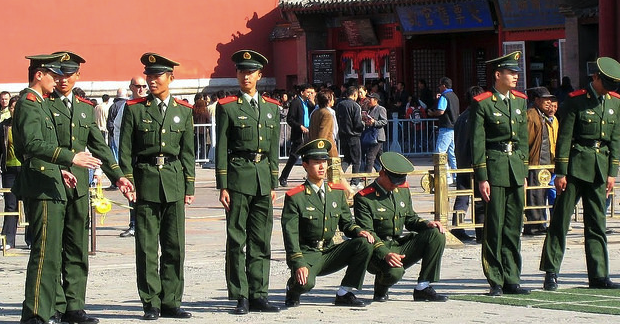How Peaceful is China's Peaceful Rise?

China’s rhetoric about a peaceful rise is being exposed as hollow as it seeks to use its growing power to challenge the status quo and promote China’s national interest. If its readiness to throw its weight around matches the country’s expected trajectory of growth and development, it may soon be said that whenever China sneezes, the world catches SARS.
In the first diplomatic challenge for the returned Turnbull government, Minister for Foreign Affairs Julie Bishop warned that China would suffer a strong reputational cost if it ignored the 12 July Permanent Court of Arbitration (PCA) verdict against it regarding the South China Sea. The legally binding yet unenforceable decision declared that Beijing had not abided by the United Nations Convention on the Law of the Sea (UNCLOS) of which it is a signatory. This was on the basis that the country had violated the economic and sovereign rights of the Philippines; and that Beijing had no historical claim to the entirety of the South China Sea. The judgement denied China the legitimacy to block maritime or airspace passage in the South China Sea or to establish Exclusive Economic Zones (EEZ) in the area. This had ramifications for the other South China Sea claimants, Brunei, Malaysia, Vietnam and the Republic of China (Taiwan), as well as providing a global precedent for other EEZs, and for Australia’s own issues with East Timor.
Beijing reacted by stating they were shocked at Bishop’s remarks and would respond resolutely against anyone that used the ruling against Chinese interests while tying it into their broader peaceful rise narrative. This included the argument that they abide by international law by allowing and continuing to allow freedom of navigation in the disputed area, and cast doubt on the impartiality and fairness of The Hague decision by arguing that the tribunal was inherently biased and unjust; that the West was attempting to use its influence over international frameworks to try and stifle China’s rise; and that China was being unfairly singled out and victimised by pointing to precedents of Western powers failing to comply with the norms of global institutions.
Motivations for foreign policy posture
China has a number of incentives for claiming the South China Sea. These include power projection, securing and fortifying the transportation routes through which natural resources flow to reach the mainland, safeguarding future claims on speculated reserves of natural resources, as well as national pride. All of these incentives boil down to power and control. Bishop’s comments and the Chinese response succinctly describe the dilemma China faces. By its own actions, China’s rhetoric about a peaceful rise is being increasingly exposed as hollow as it seeks to use its growing power to challenge the status quo and promote its national interests.
In a 2005 Foreign Affairs article, influential policymaker Zheng Bijian justified “Chinese exceptionalism” by pointing out that other emerging powers had increased their influence and precipitated their rise by acquiring resources through invasion, colonisation, expansion, or even large-scale wars of aggression. He claimed that China’s emergence was different. It had been driven by capital, technology and resources acquired through peaceful means. In this context peaceful rise evokes a romanticised history of China where the emperor governed via the mandate of heaven and the the Middle Kingdom was the world’s preeminent power and superior civilisation drawing lesser polities into its orbit. The current leadership partially draws its legitimacy by claiming succession from this lineage and argues the actions they undertake are to bring China back to greatness.
However, China’s peaceful rise can also be interpreted within the context of the globalised world within which it rises. States no longer need to invade, colonise or engage in large-scale wars to acquire resources. China’s peaceful rise might therefore become a reflection of the times we live in, with expanding economic ties cementing the bonds of friendship and making the resort to arms between nations unfathomable. To achieve its peaceful rise a peaceful global condition is essential. Not only is the concept of a peaceful rise used to allay concerns that China will use its power to further its goals at the expense of other nations, it is also used to directly contrast it with the United States which has become embroiled in the controversial War on Terror.
China’s approach to international relations
Outside of its region the Chinese have been very careful to cultivate an image of non-interference which builds on their experience as a major player in the Non-Aligned Movement during the Cold War and as a way to distinguish itself from Western powers. Its rhetorical goal of respecting national sovereignty has been very successful in Africa where China emphasises to local leaders that it can empathise with them due to its status as a developing economy and one which has also suffered from Western imperialism. Moreover, as a result of its experience with imperialism, China can assure local regimes that they have no wish to lecture or interfere in their domestic politics. This means issues such as human rights are no barrier to economic relations, offering a contrast with the West’s concerns over such matters.
As China’s power has grown, its actions have certainly cast doubts on the concept of a peaceful rise. For every successful Olympics and Confucian institute, there are territorial conflicts over the Senkaku/Diaoyu and Spratly Islands. Beijing is increasingly taking positions in opposition to the US for no other reason than to oppose it. The country’s military has grown exponentially and it is augmenting and fortifying territories under its control with aggressive positions on disputes with Japan, Vietnam, Indonesia and the Philippines. Beijing is using its economic clout by threatening damaged trading relationships with a variety of nations over issues including Tibet, Taiwan and human rights. This strategy is having increasing success as it becomes a more and more important trading partner with countries around the world. If China continues on its present rate of growth and development, as is likely, and if its readiness to throw its weight around matches this growth, then it may soon be said that whenever China sneezes, the world catches SARS.
Stjepan Bosnjak is a student at Victoria University and is in his final year of a research masters. This article is published under a Creative Commons Licence and may be republished with attribution.





